Mike Pasquale
According to his family, the titles that meant the most to Michael F. Pasquale were Dad to his four children, PopPop to his nine grandchildren, and Squal to his many friends. Michael was the family patriarch, a retired corporate leader and renowned business executive, an accomplished golf enthusiast, and a Northeast transplant to Hilton Head Island who loved his retirement life in the South. But most of all, Michael was a caring, down-to-earth, selfless person, admired and beloved by everyone who was blessed to know him.
In May 2019, Michael, then 71, was experiencing chronic back pain but assumed it was something related to his long-standing back issues. It wasn’t until he read about Alex Trebek’s pancreatic cancer diagnosis that he started thinking his symptoms could be this disease. Tests revealed the source of his pain was, in fact, pancreatic cancer. The diagnosis blindsided and devastated his entire family, as Michael was otherwise healthy and had no family history of pancreatic cancer. Michael’s wife and children committed to researching and finding the best care for him, ready to do whatever they could to give Michael the longest and best quality of life possible.
Based on his medical team’s recommendation, Michael underwent a complicated Whipple surgery, followed by a very difficult recovery and chemotherapy. Despite these treatments, by the holiday season in 2019—less than six months after his diagnosis—his family came to the painful realization that Michael would likely not survive much longer. He passed away on March 19, 2020, leaving behind many loved ones, including his wife of nearly 51 years, Pamela; his four children, Caren, Mike, Steven, and Maris, and their spouses; nine grandchildren; a large extended family; and countless friends and former colleagues.
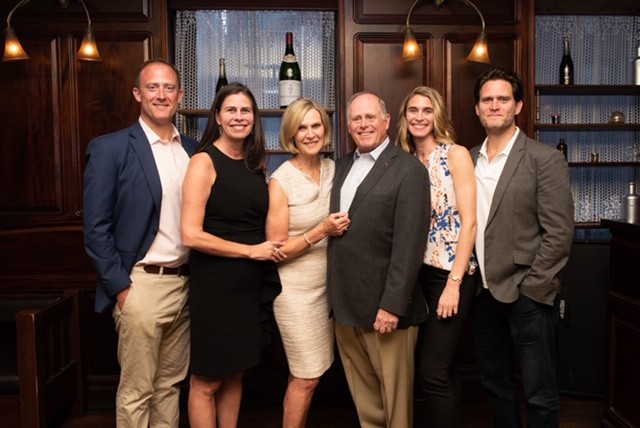
Following Michael’s passing, a business connection introduced Mike to the Lustgarten Foundation’s leadership team and to the innovative research Lustgarten is funding to advance early detection and new treatment options. Lustgarten Board member Sheila Mahony was also helpful in referring Pamela, her friend from Hilton Head Island, to the Lustgarten Foundation. Motivated by the Foundation’s dedication to supporting the most ground-breaking science, the Pasquale family has raised nearly $50,000 to date for the Lustgarten Foundation’s research program—a fundraising milestone they are eager to meet and then significantly surpass in 2025.
“My father died just as the world shut down from the COVID-19 pandemic, making it impossible to have the type of funeral or celebration of life he deserved and that would give our family the closure we needed to mourn his death,” Mike noted. The Pasquale family—brought even closer together since Michael’s death—held an outdoor celebration of life ceremony a year after Michael’s passing, but they had hoped to do more to pay tribute to a man who was so widely admired and loved.
To recognize the five-year anniversary of Michael’s passing this year, the Pasquale family is having dinner on March 19 at an Italian restaurant Michael loved, and Mike is organizing a brunch fundraiser in Long Island following the Foundation’s Long Island Walk for Pancreatic Cancer Research on October 5. The event will feature an auction and remarks from Lustgarten Foundation leadership and will benefit the Foundation’s early detection research efforts. “It’s a travesty that we’ve lost so many people to pancreatic cancer. My mom, brother, sisters, and I know our dad would want to see more people getting diagnosed earlier, giving them a fighting chance to not only survive, but thrive. Making that goal a possibility is a meaningful part of his legacy,” Mike added.
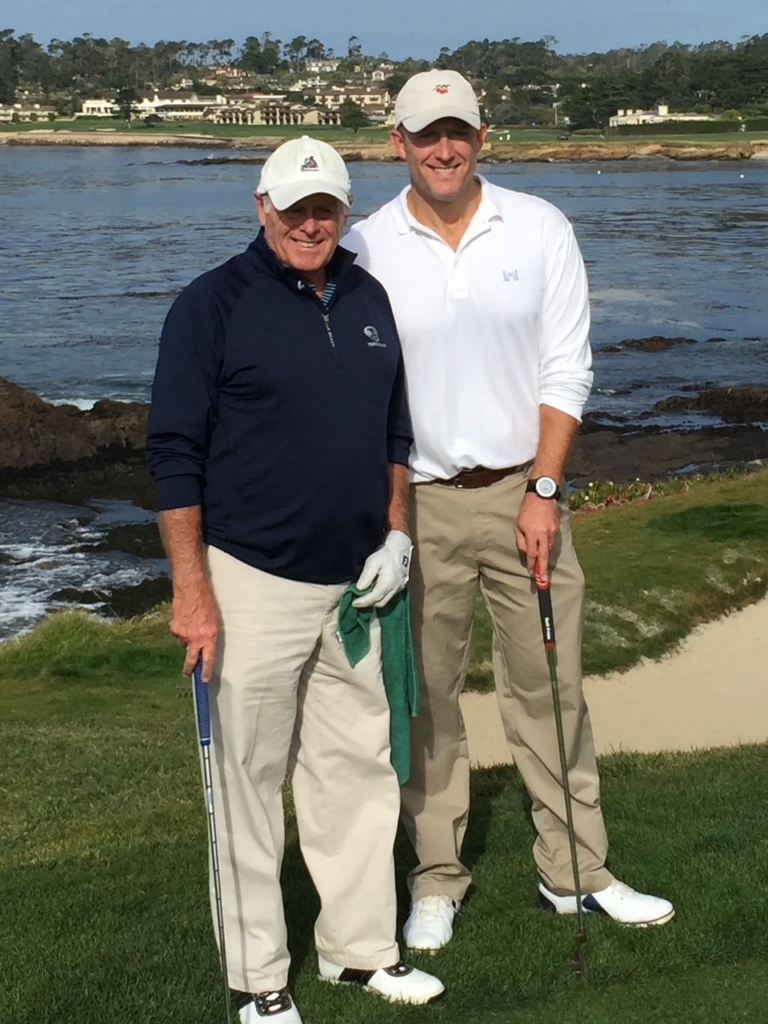
For Michael’s wife, Pamela, this anniversary is a reminder of the day her life shattered. “I ‘see’ your face every day and we ‘talk’ about the kids and grandkids, but I wish I could hold your hand again,” she shared. For Michael’s four children, this anniversary is a time to reflect on the unique bond each shared with their father. For Mike, that bond grew from their mutual love for golf and his father’s exceptional golf expertise. Mike enjoyed taking him to the most exclusive golf courses nationwide, where his dad couldn’t wait to collect $10 every time he won a round of golf against Mike. During their last golf trip, though, Mike won—one of the few times—which made his father incredibly happy. To celebrate Michael’s love for the game, Mike and a small group of relatives will gather this spring to play a round of golf together—something Mike knows his father would have enjoyed and that he was responsible for organizing in years past.
The Pasquale family is looking forward to continuing to honor Michael’s memory through their support of the Lustgarten Foundation. “I have been blessed with an unbelievable network, both professionally and personally, and I am excited and ready to ask others to join me in supporting pancreatic cancer research,” Mike shared. “The art of asking for donations from people in your network is challenging, but it’s much easier and more purposeful when there’s a foundation like Lustgarten that has done so much to first raise awareness and then has demonstrated its value through the scope of research it funds.”
Keeping you informed about recent changes and challenges affecting public funding for cancer research in the United States.
As of March 10th, 2025
For over 25 years, the Lustgarten Foundation has been a catalyst for science, funding pancreatic cancer research that has been a driving force in every major advancement since 1998. We have invested over $287.2 million—generously contributed by individuals, corporations, and foundations—to lead research, invigorate the field, and ignite a new era of progress. While our organizational model relies on private funding to support high-risk, high-reward science, public funding—government resources allocated to essential services and programs—remains vital for establishing the groundwork and sustaining the institutions where life-saving pancreatic cancer research is happening. Progress in pancreatic cancer research is accelerating, but there is more work to be done. Continued support of research is key to transforming today’s progress into real impact for patients. Maintaining a balance of private and public funding is indispensable to ensuring a continuous and effective research pipeline.
HISTORICAL SUPPORT FOR PANCREATIC CANCER
The National Institutes of Health (NIH), the largest source of government funding dedicated to advancing health research, operates with an annual budget of nearly $48 billion. Each year, the NIH has increased pancreatic cancer funding, recognizing the disease’s urgent threat and the need for improved patient outcomes. For example, NIH funding for pancreatic cancer increased from $230 million in 2020 to an estimated $286 million in 2024, supporting 740 projects in Fiscal Year 2023. Funding for pancreatic cancer research is primarily awarded through the National Cancer Institute (NCI), one of the 27 agencies and organizations that comprise the NIH. The NCI is the world’s largest funder of cancer research and supports basic and clinical research at universities, hospitals, and other institutions. NCI funding for pancreatic cancer research supports all of Lustgarten’s priority areas: early detection, therapeutic development, and personalized medicine. This includes, but is not limited to, initiatives like the Early Detection Research Network, the Pancreatic Cancer Detection Consortium, Pancreas SPORE grants, and the Cancer of the Pancreas Screening (CAPS) program.
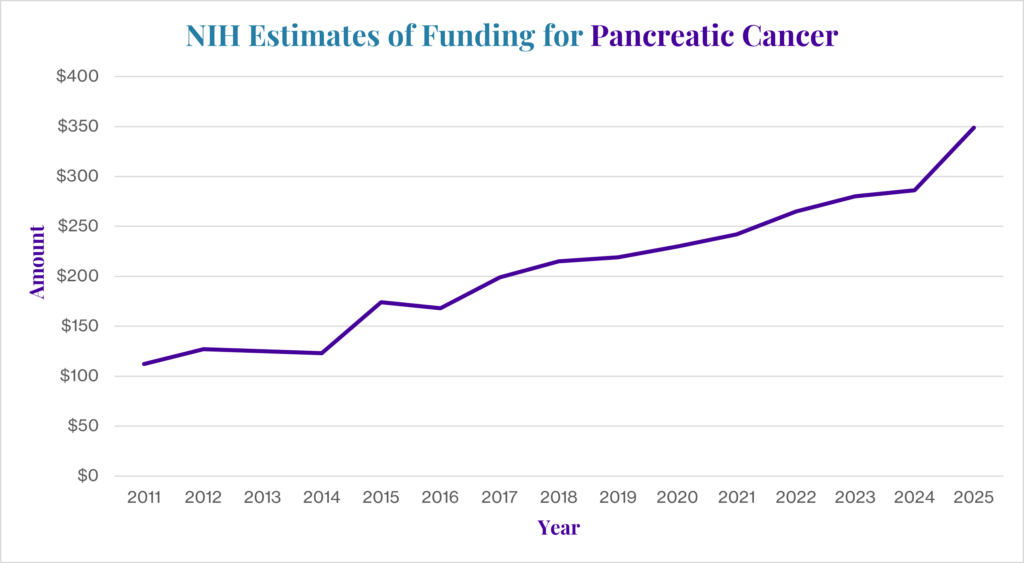
FUNDING CHANGES: WHAT IT MEANS
Beginning January 20, 2025, U.S. administration has enacted significant changes to NIH funding that impact cancer research throughout the country:
- January 21st, NIH review meetings, staff travel, and external communications were suspended.
*UPDATE – despite the initial directive’s expiration on February 1, 2025, certain restrictions persist. Notably, NIH staff are still prohibited from submitting meeting notices to the Federal Register, preventing the scheduling of essential review meetings. This continued blockade has led to a standstill in grant approvals and other critical NIH operations. - January 27th, NIH halted payments on all federal grant programs.
*UPDATE – despite these legal interventions, the initial directive caused considerable uncertainty and disruption across various sectors reliant on federal grants, particularly in scientific research and public health initiatives. - February 7th, NIH capped indirect costs at 15%, cutting approximately $4 billion per year. (Indirect costs cover essential expenses required for research, including facilities, administrative and regulatory costs, and common equipment.)
*UPDATE – the proposed cap faced immediate opposition from research institutions and state governments. On February 10, 2025, a federal judge in Boston issued a temporary restraining order blocking the implementation of the cap, citing potential harm to research institutions and public health efforts. This injunction was extended on February 21, 2025, pending a final ruling. While legal actions have temporarily halted the NIH’s proposed funding cap, the ongoing uncertainty continues to disrupt cancer research efforts nationwide. - February 15th, NIH fired nearly 1,200 employees in an initial and sweeping wave of health-related staff cuts.
- March 15th, US Congress approved a stopgap funding bill, slashing the DoD’s Congressionally Directed Medical Research Programs (CDMRP) by 57% and completely eliminating funding to Pancreatic Cancer Research Program (PCARP), the only federal initiative exclusively dedicated to pancreatic cancer. (The CDMRP fills research gaps by funding high impact, high risk and high gain projects that other agencies may not venture to fund. In FY20, the U.S. Congress established the Pancreatic Cancer Research Program (PCARP) in the DoD appropriation with a subsidy of $6M. Since then, over $66M in congressional appropriations have been committed to pancreatic cancer research through CDMRP grants.)
While existing NIH grants are continuing and the proposed cuts noted above are being challenged in the courts, changes at the NIH have had a chilling effect on new research funding. Compared to 2024, the NIH has approved roughly $1 billion less in new grants so far in 2025 ($2.5 billion in 2024 vs. $1.4 billion in 2025, comparing the first six weeks of each year respectively). These cuts are just the beginning – additional changes have been proposed that would radically alter the organization of the NIH and how research funding is administered in the United States. More broadly, changes in the priorities of the Department of Health and Human Services (HHS), which oversees the NIH and other health-related programs (including CDC, Medicare, and Medicaid) will impact clinical cancer research.
“Strong Federal support for research created the infrastructure that makes the United States a leader in biomedical innovation. Reductions in funding from the NIH will decrease innovation and slow progress.” said Andrew Rakeman, VP of Research at the Lustgarten Foundation. “Even short-term uncertainty puts specific types of research in jeopardy. Early-career scientists with bold ideas, high-risk, high-reward projects, and research in underfunded areas are most at risk—yet these are the types of research that have historically led to groundbreaking discoveries in pancreatic cancer.”
As public funding outlooks remain unpredictable, particularly for rare diseases regardless of their lethality, private financing has never been more crucial. While we continue to advocate for the full restoration of NIH funding, we remain steadfast in our mission to transform pancreatic cancer into a curable disease by investing in cutting-edge research, made possible by our dedicated community. “These are the times private foundation funding is paramount,” said Linda Tantawi, CEO of the Lustgarten Foundation. “We hope to be a beacon of light amid these devastating policy changes for pancreatic cancer researchers and scientists, inspiring hope for patients and their families that progress is on the horizon.”
WE ARE NOT DISCOURAGED
When the Lustgarten Foundation was founded, the NCI allocated only about $17 million or .6% of its annual budget to pancreatic cancer research. Over time, Lustgarten’s support of pancreatic cancer research has helped stimulate the NCI to increase its pancreatic cancer research funding to approximately $226.8 million in 2022 or 3.3% of its annual budget, contributing to the 5-year relative survival rate for all stages tripling from less than 4% to 13%. Today, thousands of researchers from various disciplines work on scientific breakthroughs that promise better outcomes for those diagnosed with this challenging disease. We will not stop until we realize our vision of a future with pancreatic cancer cures.

MAKE YOUR VOICE HEARD!
We encourage our community to join the movement to preserve critical research funding. Biomedical research is the foundation of our collective understanding and efforts to improve human health and disease. With continued upheaval around federal funding of research throughout the country, YOU can take action. Please consider contacting your representative in Washington DC and sharing your story and/or why funding research is important to you.
Jack Statfeld
Even as a teenager, when most of his peers were focused primarily on themselves, Jack was different; he was committed to, and passionate about, helping others. A self-described “go-getter,” Jack’s involvement with the Lustgarten Foundation began nearly a decade ago, while Jack was still in high school. “The severity of pancreatic cancer, the high mortality rate, and the many people my family and I have known who have either been affected or have passed away from pancreatic cancer, inspired me to get involved and have a larger impact,” Jack shared.
In 2016, Jack joined Team Just Us Jerks to participate in the challenging Tough Mudder obstacle course competition on Long Island. Together, he and his nine teammates raised $10,000 for Lustgarten’s research program, in honor of a family friend’s aunt, who is a pancreatic cancer survivor. Encouraged by this accomplishment, Jack and Just Us Jerks continued to fundraise, and by 2019, their fourth year competing in the event, Just Us Jerks had raised $50,000 for the most groundbreaking pancreatic cancer research. Eager and grateful for the chance to do even more, Jack joined Team Lustgarten for the 2020 TCS New York City Marathon. Due to the pandemic, his entry was deferred until 2022, when he raised another $5,000 for pancreatic cancer research.
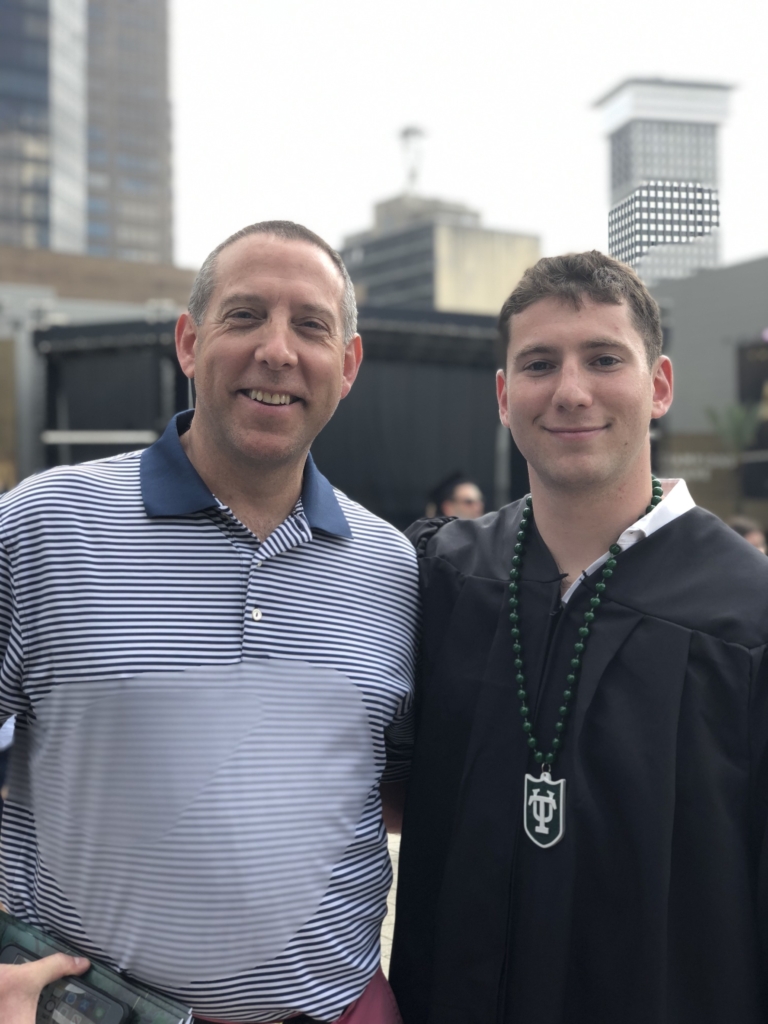
Three years later, Jack is still committed to fundraising for the Lustgarten Foundation. When he had the opportunity to participate in the 2025 United Airlines NYC Half Marathon scheduled for March 16th, he jumped at the chance. The best part? “My dad is also a member of Team Lustgarten, and this will be his first race. This marathon marks the first time I’ve been able to do something with my dad at this magnitude,” Jack shared. “I feel so blessed we will have this memory together, while raising money for such an incredible purpose.” To prepare for the marathon, Jack and his dad, Brian, have trained for the past several months, and they are looking forward to a large crowd of family and friends cheering them and the rest of Team Lustgarten on throughout the 13.1-mile course across the Brooklyn Bridge, along the FDR Drive, through Times Square, and ending in Central Park.
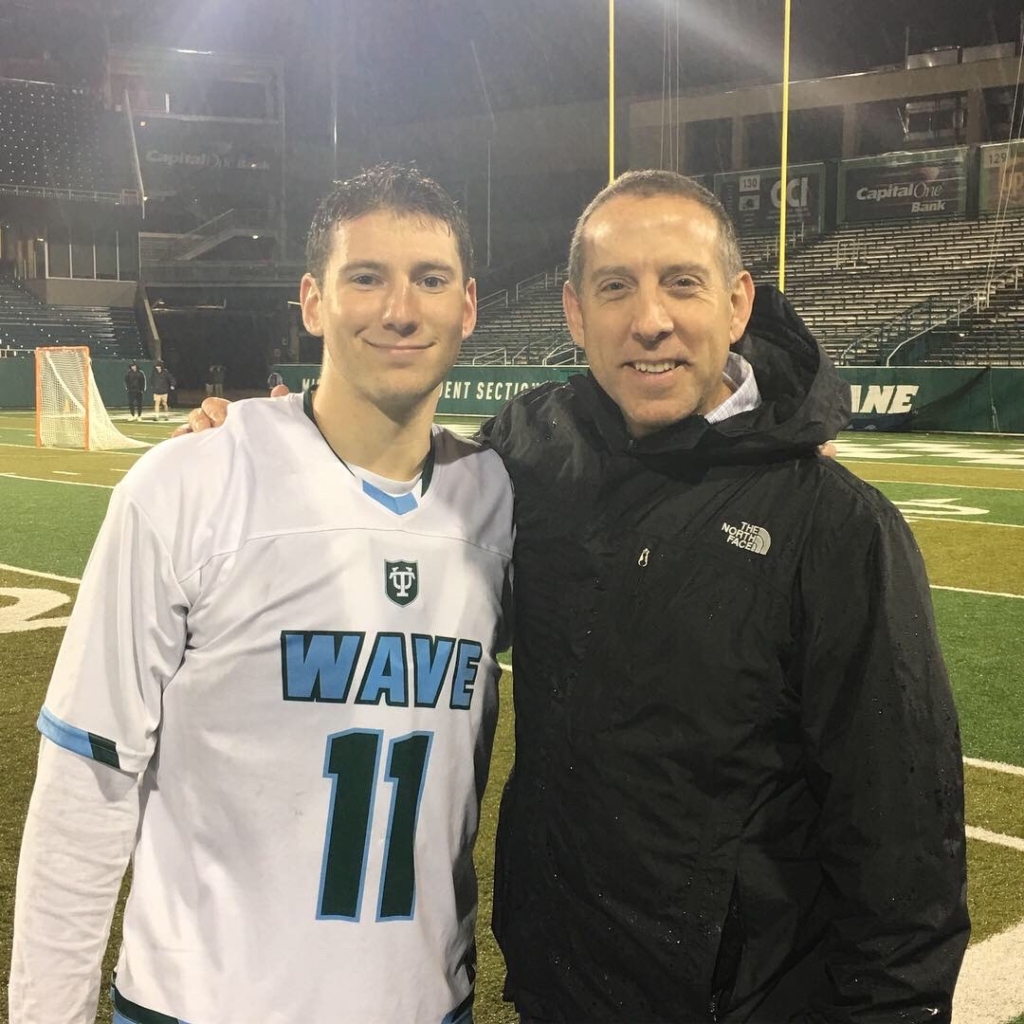
Jack encourages anyone interested in fundraising to start small and increase awareness, letting your network spread the message organically among their own networks. “You never know who may know someone who is impacted by pancreatic cancer or who will feel compelled to donate,” Jack added. “The first time you ask people to donate may feel awkward but remember that the money is going to such a worthy cause. Lustgarten invests heavily in research on new treatment options and a potential cure. The Foundation is at the forefront of the battle against pancreatic cancer and has made a huge impact on the lives of many patients, survivors, and family members.”
Jack knows that once this half marathon is over, his dedication to the Lustgarten Foundation will continue. “I will stay involved because it feels so fulfilling knowing I’m trying to make a difference for someone else who is struggling with such a life-threatening disease. There’s a ripple effect; the money I raise could potentially be the funds that go toward prolonging or hopefully even saving somebody’s life.”
The American Association for Cancer Research (AACR) is deeply concerned that the Administration’s recent actions are threatening the National Institutes of Health (NIH) and its lifesaving mission to accelerate progress for patients with cancer and the hundreds of other diseases that afflict millions of Americans.
CAI grants awarded to Gregory Beatty, MD, PhD, Dung Le, MD, and Kevin Soares, MD
UNIONDALE, N.Y., February 7, 2025 — The Lustgarten Foundation has announced three new Dr. Robert F. Vizza Lustgarten Clinical Accelerator Initiative (CAI) grants awarded to Gregory Beatty, MD, PhD, Associate Professor of Medicine (Hematology-Oncology) at the University of Pennsylvania Perelman School of Medicine for his study “Combinatorial myeloid activation as immunotherapy for metastatic pancreatic cancer,” Dung Le, MD, Professor of Oncology at Johns Hopkins University School of Medicine for her study “NC410 and FOLFIRINOX in Combination with Anti-PD-1 with and without Anti-CTLA-4 for Treatment Naive Metastatic Pancreatic Cancer,” and Kevin C. Soares, MD, Assistant Attending Surgeon of Hepatopancreatobiliary Surgery at Memorial Sloan Kettering Cancer Center (MSK) for his study “A Pilot Study of Neoadjuvant mFOLFIRINOX and ELI-002 7P with or without Anti-PD-1 Checkpoint Blockade in Borderline and Resectable Pancreatic Ductal Adenocarcinoma.” Lustgarten’s CAI speeds the translation of basic research into the clinic by supporting novel, science-driven clinical trials.

“We extend our gratitude to the Lustgarten Foundation for their generosity,” said Dr. Beatty. “In this study, we will explore innovative approaches to activate the immune system to recognize and attack pancreatic cancer cells, giving patients hope for improved treatment options and outcomes.”
Beatty’s team will test a new combination immunotherapy approach bringing together two drugs, one targeting CD40 and the other targeting Dectin-1, to activate the immune system against pancreatic cancer. Encouraging results from laboratory experiments and early human trials suggest that this combination may improve outcomes for patients with advanced pancreatic cancer. The study will enroll 50 patients with advanced pancreatic cancer to receive the drug combination, monitor tumor growth and safety, and analyze how the treatment impacts the immune system and tumor environment. The team will analyze blood and tumor samples to reveal how the treatment affects the immune system and tumor environment, identify why some patients respond better, and guide personalized pancreatic cancer therapies.
The Clinical Accelerator Initiative produces highly collaborative clinical trials with innovative, science-driven, efficient designs, using a Lustgarten-developed process based on real-time peer-review feedback. Trials funded through the CAI deeply focus on translational analysis to rapidly further our understanding of disease biology and treatment mechanisms. These “smarter” clinical trials generate large volumes of data that scientists use to help inform and improve current and future clinical trials and expedite new treatments.
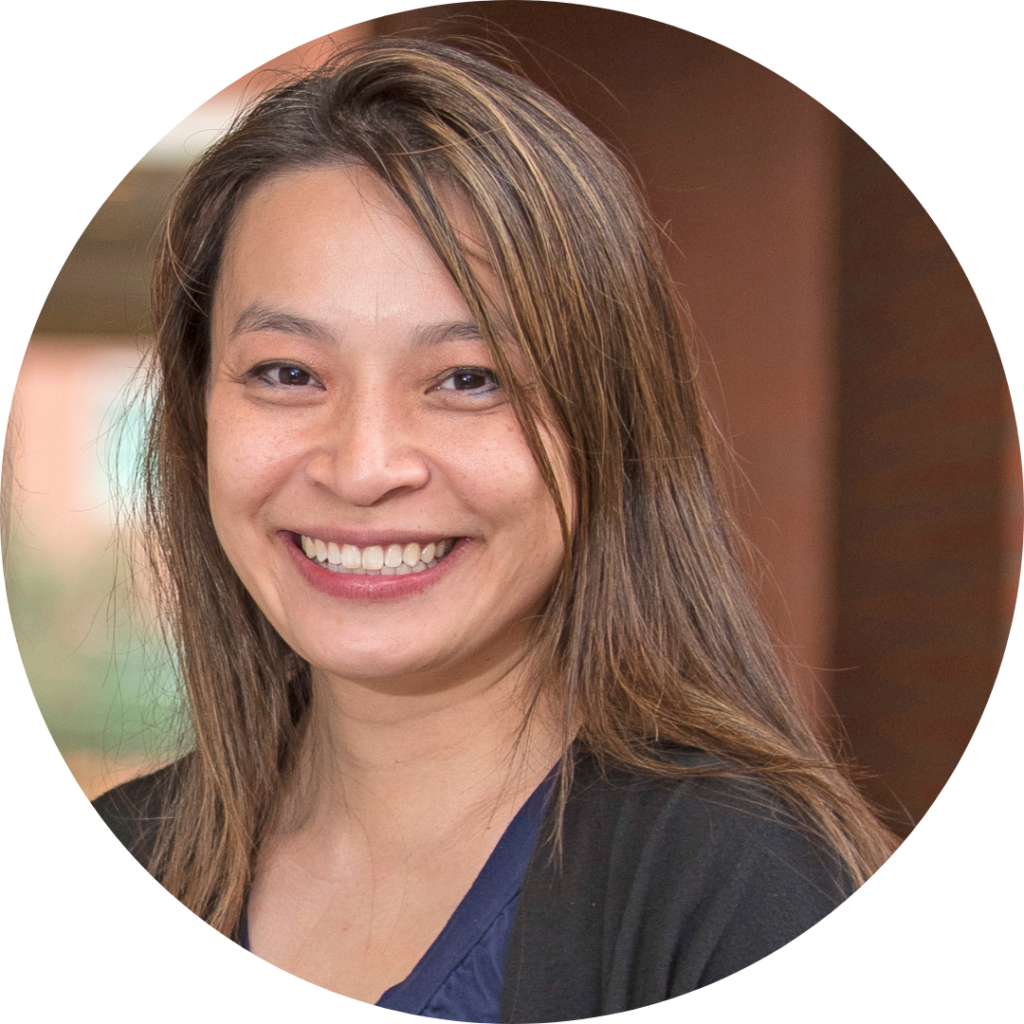
“Funding from the Lustgarten Foundation will allow us to more rapidly advance our understanding of pancreatic cancer immunology,” said Dr. Le. “In this case, we are developing novel immune regulation strategies in combination with other immune stimulatory approaches and standard chemotherapy to better understand how to use novel strategies with our current most effective therapies.”
Le and team are investigating the efficacy of immunotherapy combinations with a FOLFIRINOX chemotherapy backbone in controlling metastatic pancreatic cancer and stimulating the immune system to recognize cancer cells. NC410, a fusion protein, targets tumor collagen to release immune cells suppressed by collagen-LAIR-1 interactions, enhancing their ability to fight cancer. This study will enroll 20 patients in two treatment arms combining FOLFIRINOX, NC410, and checkpoint inhibitors (nivolumab with or without ipilimumab). The primary goal is to assess the safety and immune effects of these combinations in metastatic pancreatic cancer.
Cancer immunotherapy is the use of the immune system to prevent or treat cancer. Unlike chemotherapy or radiation, it is a type of treatment that boosts the body’s natural defenses to fight cancer. It uses substances made by the body or in a laboratory to improve or restore immune system function. Through this therapy, the immune system is guided to attack and kill the cancer cells. Immunotherapy has been very successful in treating other types of cancer, which is why pancreatic cancer experts believe it has promise.
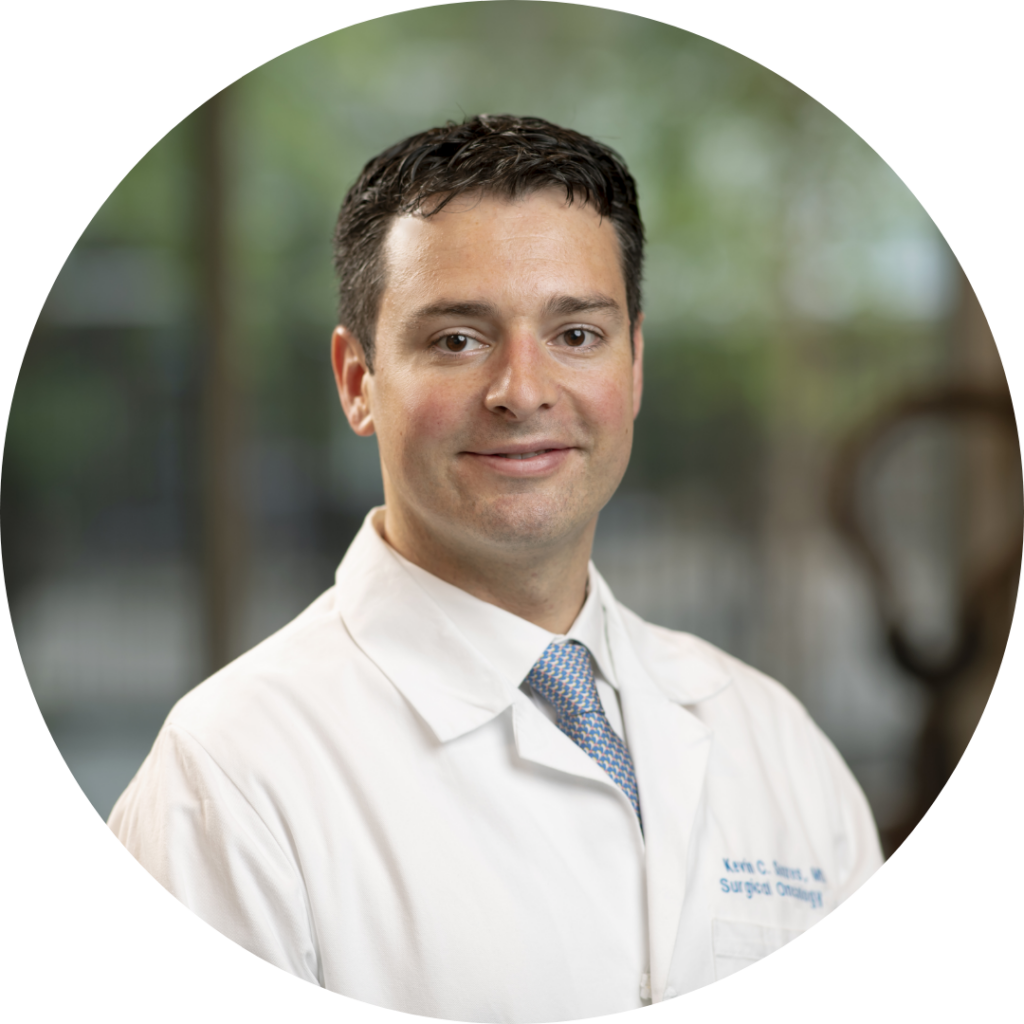
“Pancreatic ductal adenocarcinoma (PDAC) is highly lethal with an overall relative 5-year survival rate at just 13%,” said Dr. Soares. “Thanks to the Lustgarten Foundation’s support, we will evaluate whether a pancreas cancer vaccine in combination with standard chemotherapy can produce an immune response against pancreatic cancer – an approach that remains an unmet need for PDAC.”
Soares, along with co-investigator Eileen O’Reilly, Professor of Medicine, Solid Tumor Oncology at Memorial Sloan Kettering Cancer Center, are leading a multi-institutional trial that will evaluate the safety and efficacy of ELI-002 7P, an anti-KRAS vaccine, combined with chemotherapy, with or without anti-PD-1 therapy, in 20 patients with resectable or borderline resectable PDAC. Mutated KRAS, a gene that produces a protein involved in regulating cell division and growth, is found in 90% of pancreatic cancers and is considered a critical driver of pancreatic cancer. Patients will receive treatment before surgery and for 18 months after, with blood and tissue samples collected to assess immune responses and tumor changes. They will compare the immunogenicity between the groups with and without anti-PD1, as well as correlate immune responses and clinical outcomes. Data from this study will also be analyzed by a team assembled through a collaboration between the Lustgarten Foundation and Break Through Cancer’s Demystifying Pancreatic Cancer Therapies TeamLab, which is dedicated to investigating how the pancreatic cancer tumor microenvironment helps malignant cells survive chemotherapy and immunotherapy.
Learn more about the Lustgarten Foundation’s Dr. Robert F. Vizza Lustgarten Clinical Accelerator Initiative (CAI) HERE.
Lustgarten now supports 12 active CAI grants, investing nearly $20M in these “smarter” clinical trials. Learn more about funded trials in Research Matters, our annual publication that showcases our progress, and HERE.
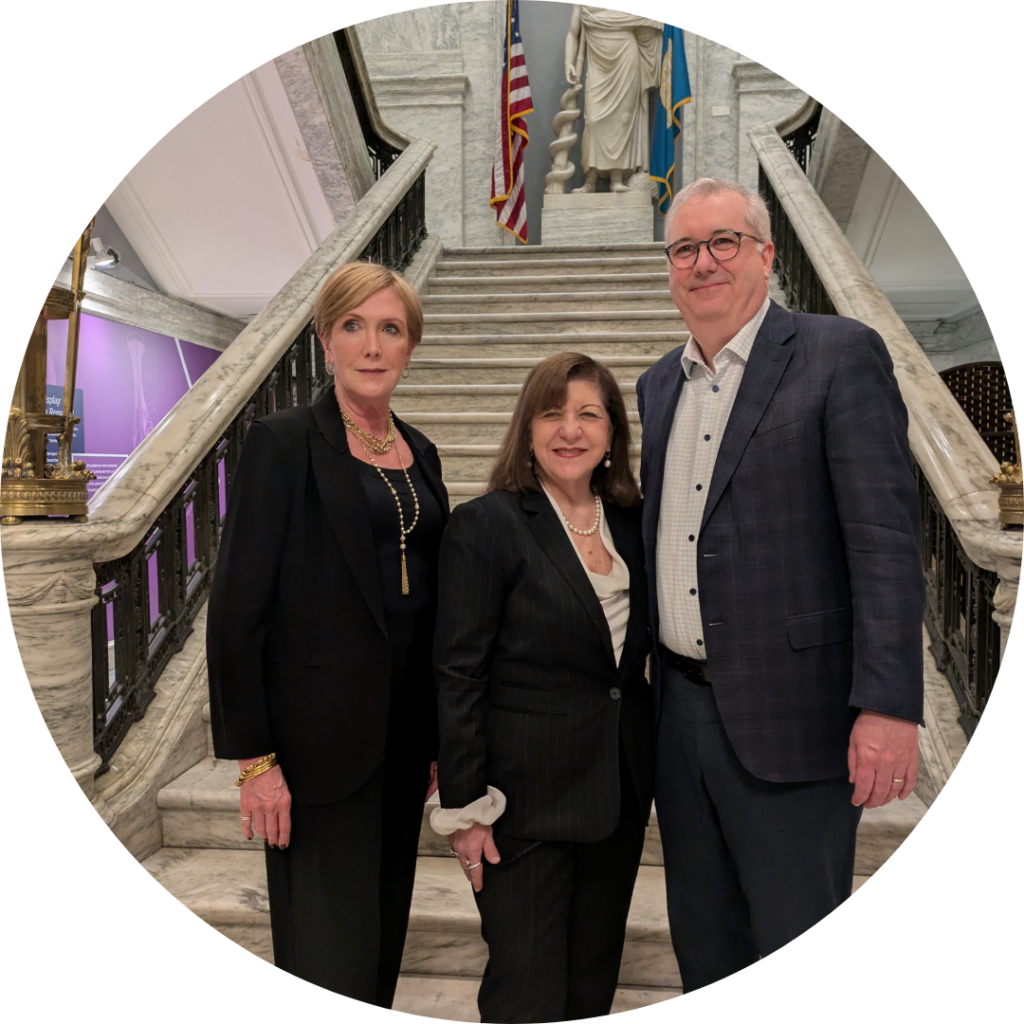
On Friday, January 10th, leading cancer research experts convened for a workshop focused on Solving the Early Detection and Diagnosis of Recalcitrant Cancers. The event, jointly hosted by the Lustgarten Foundation, the Mark Foundation for Cancer Research, and the American Association for Cancer Research (AACR), showcased how partnership drives progress in addressing critical gaps in cancer research, particularly in early detection—a frontier that holds promising life-saving potential.
A Powerful Alignment
For 26 years, Lustgarten has championed advancements in pancreatic cancer research, specifically focusing on early detection and interception, therapeutic development, and personalized treatment efforts. Guided by a commitment to collaboration, Lustgarten fosters information sharing as a critical driver of progress—a value shared by both AACR and the Mark Foundation for Cancer Research.
During early discussions, the Lustgarten Foundation and the Mark Foundation realized their alignment in prioritizing early detection research. While Lustgarten maintained a pancreatic cancer focus, the Mark Foundation, which actively partners with scientists to accelerate research that redefines the prevention, diagnosis, and treatment of cancer, expanded the scope to include other cancer types. As plans for a workshop began to take shape, AACR, the first and largest organization dedicated to conquering cancer, was invited to the table, adding its expertise and extensive network to the initiative. This collaboration first materialized with a smaller meeting in June 2024, bringing researchers together to brainstorm and lay the groundwork for the January event.
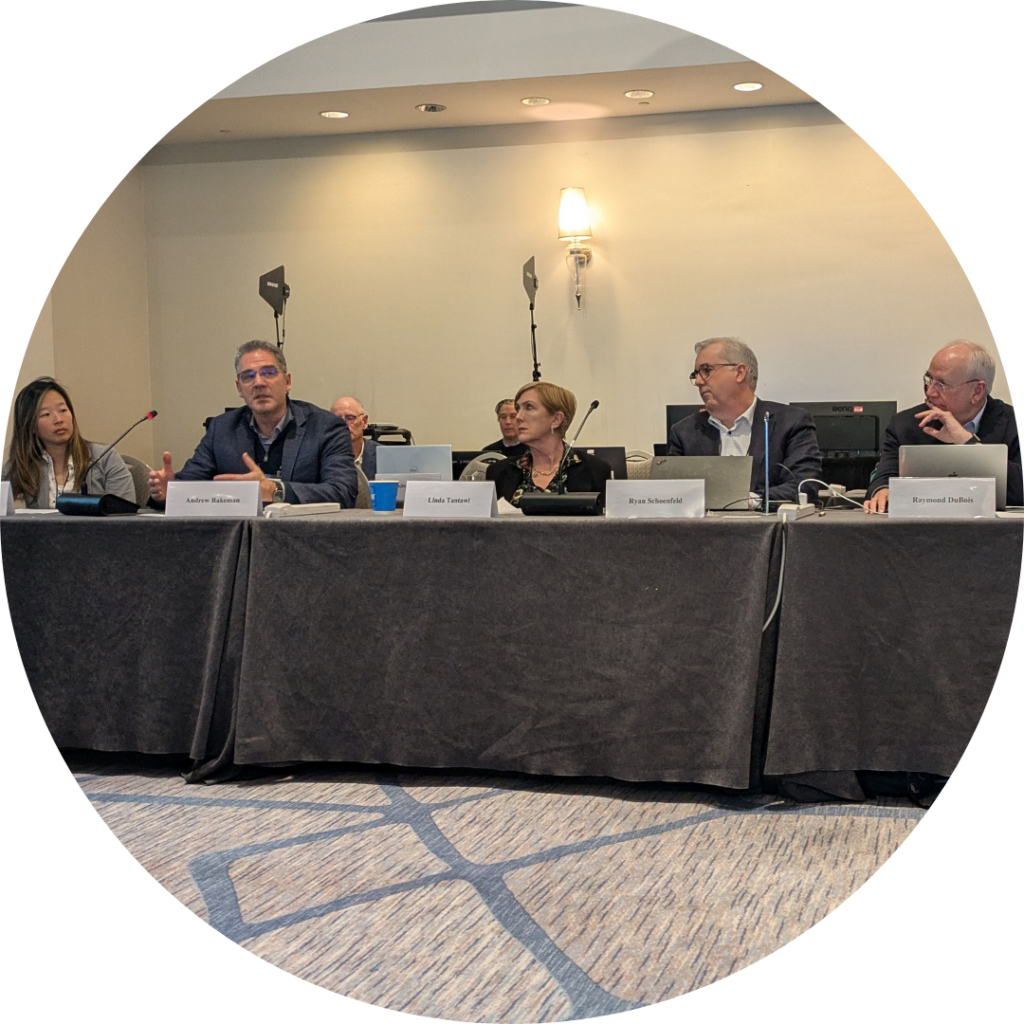
Addressing Key Challenges in Early Detection
The Early Detection Workshop assembled experts from diverse fields to discuss some of the most pressing issues in cancer research. Participants were split into groups, each focusing their discussions on:
- New Methods to Detect Pre-Invasive Cancers: Researchers presented innovative technologies and approaches for detecting cancers before progression to invasive stages.
- Multi-Modality Early Detection: This group explored how combining methods could improve detection in individuals at high risk for cancer.
- Clinical Trial Design and Regulatory Strategy: Challenges in designing effective and ethical trials for early detection technologies were discussed, alongside strategies for navigating regulatory and economic hurdles.
- Interception and Early Intervention Therapies: Participants examined therapies aimed at halting cancer progression at the earliest possible stage.
New and existing technologies, improving clinical trial frameworks, and ensuring real-world applicability of laboratory innovations were key discussion topics. The emphasis was on creating sustainable and scalable solutions that could address the lack of effective early detection across various cancer types, including pancreatic, ovarian, and brain cancers.
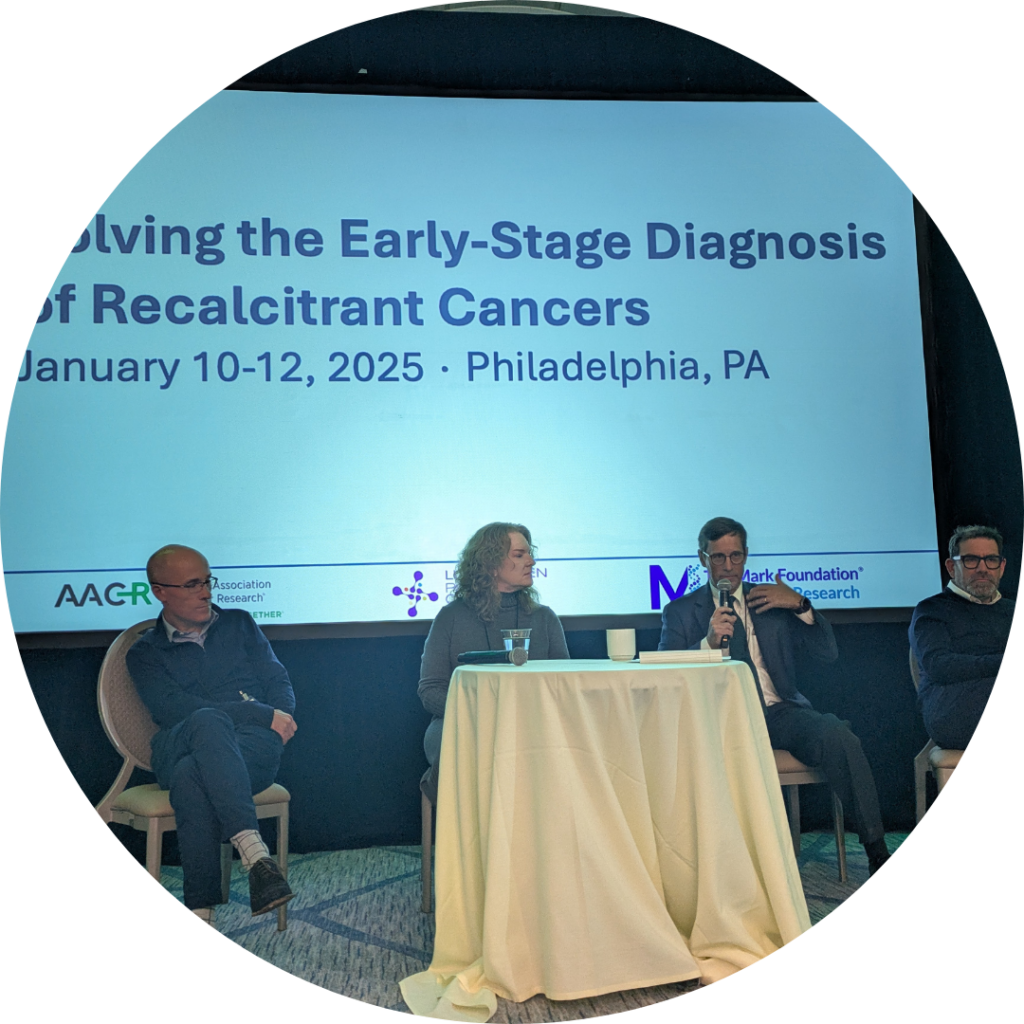
A Spirit of Collaboration
Workshop chairs and group leaders including world-renowned researchers such as David Tuveson, MD, PhD, Director of the Cold Spring Harbor Laboratory Cancer Center and the Chief Scientist for the Lustgarten Foundation, Elaine Mardis, PhD, co-executive director of the Steve and Cindy Rasmussen Institute for Genomic Medicine at Nationwide Children’s Hospital, Charles Swanton, MBPhD, FCRP, FMedSci, FAACR, FRS, Deputy Clinical Director of the Francis Crick Institute, and Luis Diaz, MD, Head of the Division of Solid Tumor Oncology at Memorial Sloan Kettering Cancer Center. The event attracted participation from major organizations interested in early detection beyond the three sponsoring organizations, including representation from Break Through Cancer, Stand Up to Cancer, NIH, the American Cancer Society, GRAIL, Exact Sciences, and more.
The diversity of expertise underscores the collaborative spirit of the initiative. Each participant brought a unique perspective, fostering cross-disciplinary discussions that will shape the future of early detection research.
A Promising Path Forward
As a leader in cancer research, the Lustgarten Foundation prioritizes uniting like-minded organizations to overcome barriers and advance progress in treating some of the most challenging cancer types, including pancreatic cancer. Collaboration among researchers and funders is essential to improving patient outcomes and realizing a shared vision of a future with cancer cures. Progress in early detection not only brings us closer to curing cancer but to preventing it altogether.


